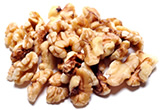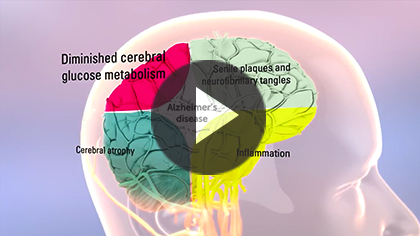6 Foods to help reduce the risk of Alzheimer’s disease
Learn about foods that have vital nutrients that may improve brain health and lower the risk of developing dementia1-4:

Walnuts
Did you ever notice how walnuts look like little brains? Walnuts contain the omega-3 fatty acids your brain needs to help carry out motor coordination and memory. Almonds, pecans, and hazelnuts are also rich in these fats and contain vitamin E, which helps to protect the brain.

Berries
Berries are a great source of antioxidants that can help reduce inflammation, allowing brain cells to work more efficiently. A study by Tufts University also linked berry consumption with helping the brain’s ability to process information better.

Spinach
A national study demonstrated that women in their 60s who ate leafy greens regularly performed better on memory and verbal tests compared with women who did not. Kale is another leafy green that contains antioxidants, fiber, and vitamin C, which may help to prevent Alzheimer’s disease.

Salmon
Don’t be afraid to load up on this kind of fat! Eating 8 oz of fatty fish (including mackerel, sardines, herring, or white tuna) per week may help to slow cognitive decline (the way a person thinks, reasons, and solves problems).

Turmeric
If you are not familiar with this spice already, start adding it to your diet. A review of animal and human studies showed that consuming turmeric (curcumin), sometimes in pill form, may have antioxidant, antiinflammatory, and plaque-reducing properties, all of which may be beneficial in Alzheimer's disease.

Wine
Drinking wine in moderation can be beneficial. A French study showed Alzheimer’s disease was reduced by 75% in people who drank three 4 oz glasses of wine a day. An additional study found that cabernet sauvignon significantly reduced deterioration of spatial memory function (memory responsible for recording information about a person’s environment/surrounding). The wine consumption also helped to prevent buildup of plaques in the brain, which is associated with Alzheimer’s disease.


